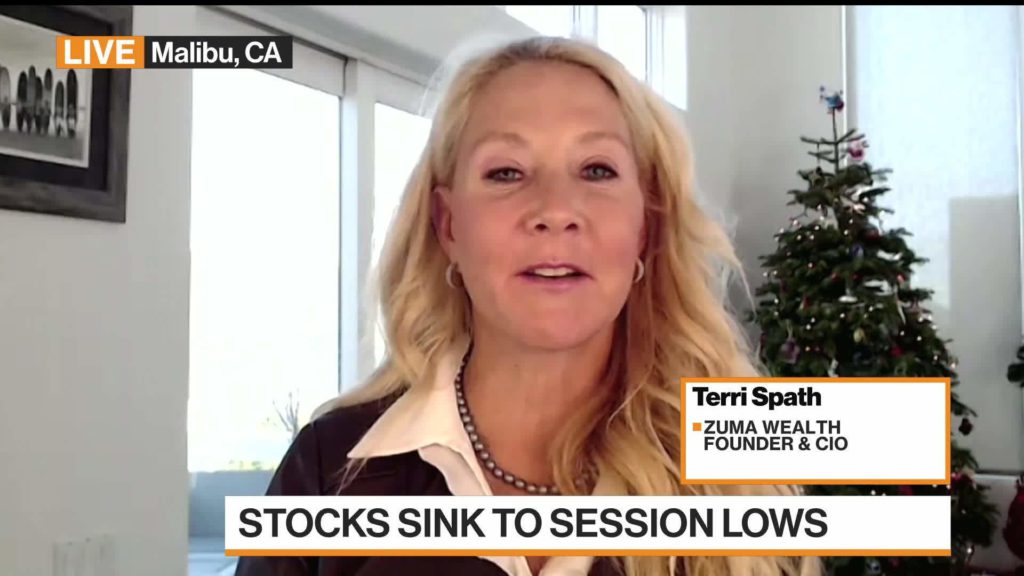US stocks oscillated between gains and losses throughout a volatile session on Tuesday, with technology shares still under pressure after last week’s hawkish central bank turn. Treasuries slumped, with the global bond market digesting the Bank of Japan’s sudden increase in its yield trading band.
(Bloomberg) — US stocks oscillated between gains and losses throughout a volatile session on Tuesday, with technology shares still under pressure after last week’s hawkish central bank turn. Treasuries slumped, with the global bond market digesting the Bank of Japan’s sudden increase in its yield trading band.
The S&P 500 ended the session with a modest gain, snapping a four-day losing streak. The tech-heavy Nasdaq 100 fell for the fifth day, its longest stretch of declines since October, as investors continue to digest the threat of higher interest rates well into 2023. With few macro catalysts before the end of the year, swings are liable to pick up, as stocks witnessed on Tuesday.
FedEx Corp. and Nike Inc. reported earnings after the markets closed. FedEx posted fiscal second-quarter earnings that beat analysts’ estimates, buoyed by price increases and cost cuts that helped make up for a decline in package volume. While Nike Inc. reported another quarter of inventory buildup, its quarterly sales and gross margin exceeded Wall Street’s estimates. Shares of both firms rose postmarket.
Read More: S&P 500 Faces ‘Vol Killer’ With Options Whale’s Hedge
Treasuries broadly held losses, with the 10-year rate climbing to around 3.69%. Yields rose after a hawkish move from the Bank of Japan sent the yen soaring more than 4% against the dollar at one point. Analysts reckon more losses lie ahead as Japanese investors — major players in US and European debt — have incentive now to bring money home.
Until now, the BoJ has been an outlier among central banks, most of which have rapidly tightened policy. The Japanese monetary authority adjusted its yield curve control program to allow 10-year borrowing costs to rise to around 0.5%, versus the previous 0.25% upper limit, bucking forecasts for no change at its policy meeting.
“Tighter BoJ policy would remove one of the last global anchors that’s helped to keep borrowing costs at low levels more broadly,” Deutsche Bank analysts told clients, noting the BoJ move had come as markets were “already reeling” from the European Central Bank and Federal Reserve’s hawkishness last week.
Many economists now expect the BOJ to raise interest rates next year, joining the Fed, the ECB and others after a decade of extraordinary stimulus.
Read More: BOJ Blindsides Traders to Echo Christmas Day Shock of 1989
However, Evercore ISI’s Krishna Guha and Peter Williams said elevated FX hedging costs mean Japanese investors have already stopped being net buyers of US government debt. The BoJ as the biggest holders of Japanese government bonds would take most of the loss from duration risk on its own balance sheet, they wrote in a note.
“In other words, this is a disruptive jolt but not a cataclysmic event for global markets,” they said. “The BoJ may be demonstrating that it is actually possible to exit yield curve control in phases in a manageable way, though one that still has material implications for markets.”
Meanwhile, data showed new US home construction continued to decline in November and permits plunged, an indication that Fed tightening is serving its purpose. However, closing prices climbed in the third quarter, and the Fed will continue to raise rates if housing remains costly, which could be detrimental for risk assets in the long run.
Key events this week:
- EIA Crude Oil Inventory Report, Wednesday
- US existing home sales, US Conference Board consumer confidence, Wednesday
- US GDP, initial jobless claims, US Conf. Board leading index, Thursday
- US consumer income, new home sales, US durable goods, PCE deflator, University of Michigan consumer sentiment, Friday
Some of the main moves in markets:
Stocks
- The S&P 500 rose 0.1% as of 4 p.m. New York time
- The Nasdaq 100 fell 0.1%
- The Dow Jones Industrial Average rose 0.3%
- The MSCI World index fell 0.7%
Currencies
- The Bloomberg Dollar Spot Index fell 0.7%
- The euro was little changed at $1.0615
- The British pound rose 0.2% to $1.2171
- The Japanese yen rose 3.8% to 131.75 per dollar
Cryptocurrencies
- Bitcoin rose 1.6% to $16,858.48
- Ether rose 3.1% to $1,212.79
Bonds
- The yield on 10-year Treasuries advanced 10 basis points to 3.69%
- Germany’s 10-year yield advanced 10 basis points to 2.30%
- Britain’s 10-year yield advanced nine basis points to 3.60%
Commodities
- West Texas Intermediate crude rose 1.2% to $76.09 a barrel
- Gold futures rose 1.7% to $1,827.90 an ounce
This story was produced with the assistance of Bloomberg Automation.
–With assistance from Cecile Gutscher and Vildana Hajric.
More stories like this are available on bloomberg.com
©2022 Bloomberg L.P.










